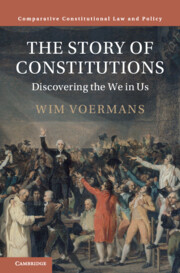Book contents
- The Story of Constitutions
- Comparative Constitutional Law and Policy
- The Story of Constitutions
- Copyright page
- Dedication
- Epigraph
- Contents
- Figures
- Prologue
- 1 Introduction
- Part I Constitutional Diffusion
- Part II The History of the Constitution
- 4 Precursors
- 5 Etched into Collective Memory
- 6 Roman Roots
- 7 Mediaeval Constitutions
- 8 Early-Modern Constitutions
- 9 Generations
- 10 Second Generation
- 11 Third Generation
- 12 Fourth Generation
- 13 Fifth Generation
- 14 Sixth Generation
- 15 The Seventh Generation
- 16 The Eighth Generation
- 17 What Are the Lessons of History?
- Part III Concepts, Shapes and Types of Constitutions
- Part IV Effects
- Part V The Imagined Order of the Constitution
- References
- Name & Author Index
- Subject Index
7 - Mediaeval Constitutions
from Part II - The History of the Constitution
Published online by Cambridge University Press: 19 October 2023
- The Story of Constitutions
- Comparative Constitutional Law and Policy
- The Story of Constitutions
- Copyright page
- Dedication
- Epigraph
- Contents
- Figures
- Prologue
- 1 Introduction
- Part I Constitutional Diffusion
- Part II The History of the Constitution
- 4 Precursors
- 5 Etched into Collective Memory
- 6 Roman Roots
- 7 Mediaeval Constitutions
- 8 Early-Modern Constitutions
- 9 Generations
- 10 Second Generation
- 11 Third Generation
- 12 Fourth Generation
- 13 Fifth Generation
- 14 Sixth Generation
- 15 The Seventh Generation
- 16 The Eighth Generation
- 17 What Are the Lessons of History?
- Part III Concepts, Shapes and Types of Constitutions
- Part IV Effects
- Part V The Imagined Order of the Constitution
- References
- Name & Author Index
- Subject Index
Summary
The law of the virtual Roman Empire persisted throughout the Middle Ages, combined with customary law, like Salic law, or Saxon Law. Roman law was rediscovered and studied in the first universities in Western Europa. Legal scholars of the day made comments and thus developed so-called canon law: a mix of roman, medieval and religious law. At the same, as a result of feudal relations, quid pro quo documents, like the magna Charta and Joyous entries, emerged, granting different classes different privileges and rights in turn for assistance, tax and loyalty to a ruler. This marked the beginning of conditional power and the rule of law.
Keywords
- Type
- Chapter
- Information
- The Story of ConstitutionsDiscovering the We in Us, pp. 104 - 117Publisher: Cambridge University PressPrint publication year: 2023

